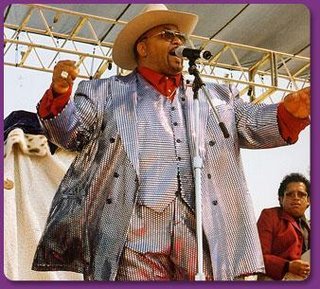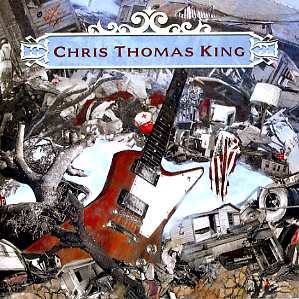A version of this was published in The Santa Fe New MexicanDecember 2, 2005To filmmaker
Robert Mugge, music is a metaphor for the human spirit.
“It’s beneath the surface in every film I’ve made,” he said in a recent telephone interview. “Music is a leaping-off place for discussions of social issues, cultural issues, political issues, even religious issues.”

Mugge, who will be in town to present three of his music documentaries at the
Santa Fe Film Festival, is enmeshed in a project to document the effects of Hurricane Katrina on a city that is a major wellspring of American music. Mugge is making the Katrina movie for the cable network Starz.
“The story of what’s happening in New Orleans is so big,” Mugge said, “you can turn on a camera anywhere there and get something interesting. You can talk to anyone you see on the street and get a great story. So music makes it a manageable focus.”
Music has been a metaphor for Mugge’s spirit since his early childhood in North Carolina in the early 1950s, when a radio introduced him to the strange and alluring world of American music — country, gospel, and rock ’n’ roll.
Mugge began studying film in the early ’70s at the University of Maryland in Baltimore. By the end of the ’70s he’d made documentaries about Frostburg, Md. (an Appalachian mining town where he’d gone to college in the 1960s), and controversial Philadelphia Mayor Frank Rizzo.
George Crumb: Voice of The Whale (1976), a portrait of the contemporary avant-garde composer, was Mugge’s first music movie.
In 1978 Mugge began filming
Sun Ra: A Joyful Noise, a portrait of the Alabama-born jazz spaceman. From then on, music, musicians, and places where music is made have been his focus.
Music isn’t shortchanged in Mugge’s movies. Unlike many music documentaries that interrupt great performances for inane fan chatter or irrelevant observations, Mugge frequently allows the whole song to play and let the music speak for itself. And his interview segments almost always go straight to the core.
Mugge has made documentaries about bluegrass, reggae, and Hawaiian music and has done films centered on Rubén Blades, Sonny Rollins, Robert Johnson, and Gil Scott-Heron. In 1984’s
Gospel According to Al Green, Mugge became the first interviewer to get the soul singer to open up about a terrible night in which a spurned girlfriend threw a pot of boiling grits on him — causing second-degree burns — then went into a bedroom and fatally shot herself.
He’s done several movies on the blues, three of which are showing at the film festival.
Deep Blues, a 1991 film narrated by Arkansas music writer Robert Palmer, features performances by Mississippi masters R.L. Burnside and Junior Kimbrough — captured on film well before they became cult heroes on Fat Possum records — as well as lesser-known worthies like Jessie Mae Hemphill (both solo and with her fife-and-drum band), Roosevelt “Booba” Barnes, and Big Jack Johnson.
Mugge said that a major point of
Deep Blues was that pockets of authentic Mississippi blues were alive and well. But by 1999, when he made
Hellhounds on My Trail: The Afterlife of Robert Johnson, “I started to sense (Mississippi blues) was beginning to die. A lot of performers were dying, and jukes were closing down.”
That concern prompted him in 2003 to make
Last of the Mississippi Jukes, which also is showing at the film festival. While it’s full of high-powered performances by Alvin Youngblood Hart, Chris Thomas King, Vasti Jackson, Bobby Rush, and Patrice Moncell, it’s ultimately a sad film.
It starts off with a brand-new juke joint in Clarksdale, Miss., the Ground Zero Blues Club, which is co-owned by actor Morgan Freeman. But it ends at the Subway Lounge in Jackson, Miss., shortly before the club closed. At the end of the film there’s hope that the Subway would be renovated and revived. However, due to structural problems, the building has since been demolished.
The third film Mugge presents in Santa Fe is
Rhythm ’N’ Bayous: A Road Map to Louisiana Music, originally released in 2000. Mugge said the purpose of this film was to show the impressive breadth of music in Louisiana — Cajun, zydeco, Creole, gospel, country, blues, soul, funk, jazz, rock ’n’ roll — and not just focus on “the same people” usually chosen to represent Louisiana music.
Among those featured in the movie are jazz trumpeter Kermit Ruffins, rockabilly artist Dale Hawkins, New Orleans rocker Frankie “Sea Cruise” Ford, and blues pianist Henry Butler.
Rhythm ’N’ Bayous can be considered a preamble to his new project about Katrina’s effect on New Orleans music, a joyful picture of “before” that will provide a sad contrast with the “after” that Mugge is documenting.
In the days before his interview with
Pasatiempo, Mugge had been in New Orleans and other locales in the South talking with and filming performances of New Orleans musicians. He found cars on top of houses and in swimming pools, and he saw mysterious men dressed in black patrolling the neighborhoods at night. He filmed in clubs with no running water and unspeakably foul restrooms.
Mugge convinced the Army Corps of Engineers to take him up in a helicopter for an aerial perspective of the city and of landmarks such as Fats Domino’s house. Mugge’s co-producer, Diane Zelman, convinced a voodoo priestess to allow the crew to shoot a voodoo ceremony in a neighborhood where electricity hadn’t been restored. At the climax of the ritual — whose purpose was “to bring the city back to life,” Mugge said — the lights suddenly came back on, evoking nervous laughter from all involved.
Mugge filmed a gig at Grant Street Music Hall in Lafayette in which Marcia Ball presented fellow pianist Eddie Bo with a new electronic keyboard to replace the one he’d lost in the hurricane.
He shot an unknown guitarist playing an unplugged electric guitar on the roof of his mother’s home.
“We filmed Irma Thomas going back to her home, which is now gutted,” Mugge said, speaking of the venerated soul singer. “We went with her to her nightclub, the Lion’s Den, which was destroyed. She pointed to these Christmas lights on the wall and said, ‘You guys put those there 12 years ago’” when Mugge filmed Thomas for True Believers, a film about Rounder Records.
The new Thomas footage as well as that of Ruffins, whom he tracked down in Houston, will be interspersed with old performance footage “from happier times.”
A major question underlying the Katrina project is whether New Orleans will survive as a living, thriving music center. It’s a question Mugge has yet to answer.
“Cyril Neville believes there’s a real conspiracy among white financial people to do away with the black, impoverished neighborhoods,” Mugge said. “That’s where the people get this culture that’s responsible for this music.”
But even people who are less conspiracy-minded fear that New Orleans will be rebuilt as a Disneyfied version of its former self, perhaps something like Beale Street in Memphis, once a bucket-of-blood crucible of the blues, now an upscale tourist district offering safe, sanitized blues.
“People want to make sure that the city (government) doesn’t sell them out and don’t try to turn it into a new Las Vegas,” Mugge said.
Many New Orleans musicians have fled and might not return. Ruffins is Houston, Eddie Bo in Lafayette, and Neville in Austin, Texas. “These guys are really good and they’re still New Orleans musicians,” Mugge said. “But if New Orleans ceases to be New Orleans, there’s no place for them. If every city in the country has its own New Orleans musician, are they truly New Orleans musicians if the city’s ceased to function?”
New Orleans, Mugge says, “is like a body without a spirit. The music itself is the spirit.”
(The photo way above is Robert Mugge with Jack Owens during the filming of
Deep Blues.)Schedule for Mugge Films at Santa Fe Film Festival
Deep Blues 7:30 p.m Thursday Dec. 8
Rhythm 'N' Bayous 2:30 p.m. Friday Dec. 9
Last of the Mississippi Jukes 2:30 p.m. Sunday Dec. 11
(All at CCA Cinematheque, 1050 Old Pecos Trail, Santa Fe NM 87505, phone: 505 982 1338)











